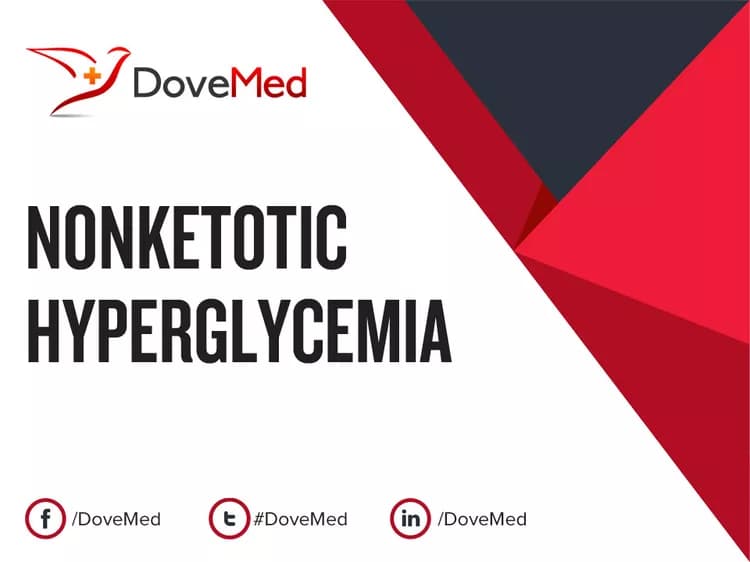What are the other Names for this Condition? (Also known as/Synonyms)
- Aminomethyltransferase Deficiency (Disorder)
- Non-Ketotic Hyperglycemia
- Tetrahydrofolate Aminomethyltransferase Deficiency
What is Nonketotic Hyperglycemia? (Definition/Background Information)
- Nonketotic Hyperglycemia is a sudden complication of type 2 diabetes. It is a condition in which the blood sugar goes so high that is results in severe weakness and confusion. Sometimes, it can lead coma and death, if neglected
- Nonketotic Hyperglycemia is common in senior citizens (over 65 years) who have type -2 diabetes. The most common causes of this condition are pneumonia and urinary tract infections (UTI)
- The condition is treated with aggressive fluid replacement and intravenous insulin to correct the blood sugar level. Nevertheless, the mortality rate of Nonketotic Hyperglycemia is high at 40%
- Nonketotic Hyperglycemia can be prevented by proper blood sugar control and regularly testing blood sugar levels at home
Who gets Nonketotic Hyperglycemia? (Age and Sex Distribution)
- Nonketotic Hyperglycemia is common in older adults with type 2 diabetes, who are above 65 years of age
- Both men and women are affected; there is no gender predilection
- The condition is observed worldwide in individuals with type 2 diabetes
What are the Risk Factors for Nonketotic Hyperglycemia? (Predisposing Factors)
Individuals with uncontrolled type 2 diabetes are at risk for Nonketotic Hyperglycemia. The risk factors associated with the condition include:
- Stress
- Non-compliance with medicine or diet
- Family history of Nonketotic Hyperglycemia
It is important to note that having a risk factor does not mean that one will get the condition. A risk factor increases ones chances of getting a condition compared to an individual without the risk factors. Some risk factors are more important than others.
Also, not having a risk factor does not mean that an individual will not get the condition. It is always important to discuss the effect of risk factors with your healthcare provider.
What are the Causes of Nonketotic Hyperglycemia? (Etiology)
Nonketotic Hyperglycemia is a complication of type 2 diabetes mellitus. The following factors usually trigger the onset of this complication:
- Acute infections such as pneumonia or urinary tract infection
- Stroke
- Myocardial infarction (heart attack)
- Intracranial (brain) hemorrhage
- Alcohol or cocaine abuse
- Burns
- Trauma
- Surgery
- Sepsis
- Certain medicines such as steroids, diuretics, anti-seizure and antipsychotic drugs
What are the Signs and Symptoms of Nonketotic Hyperglycemia?
The signs and symptoms of Nonketotic Hyperglycemia have a gradual onset and they progressively get worse over 4-6 days. The signs and symptoms of the condition include:
- Thirst with excessive drinking of water
- Excessive urination
- Weakness and severe fatigue
- Confusion
- Coma, if the condition is left unattended
How is Nonketotic Hyperglycemia Diagnosed?
The diagnosis of Nonketotic Hyperglycemia includes a complete evaluation of one’s medical history along with a thorough physical exam. The following tests are generally carried out:
- Blood sugar levels
- Blood sodium, potassium, chloride, and bicarbonate levels
- Urine test
- Blood gas test to check for acid build up in blood
- Chest X-ray (for evidence of pneumonia or infection)
Many clinical conditions may have similar signs and symptoms. Your healthcare provider may perform additional tests to rule out other clinical conditions to arrive at a definitive diagnosis.
What are the possible Complications of Nonketotic Hyperglycemia?
Complications of Nonketotic Hyperglycemia are:
- Progressive weakness and confusion
- Delirium and hallucination
- Kidney failure
- Alzheimer's dementia can worsen in individuals with Nonketotic Hyperglycemia
- Seizures
- If left untreated, the condition can lead to coma and death.
How is Nonketotic Hyperglycemia Treated?
The treatment of Nonketotic Hyperglycemia may include:
- Adequate fluid replacement of the body: The fluid replacement is very important to protect and save the kidney from severe damage
- Aggressive control of blood sugar with continuous infusion of insulin through the vein (continuous insulin drip)
- Prompt replacement of the depleted electrolytes such as potassium
- Monitoring the urine output with a “catheter”
- Simultaneously treating the infection (if any) that triggered the condition, such as the use of antibiotics for pneumonia or urinary infection
- Additional supportive care, like nasal oxygen, if blood oxygen level is low
- Correcting the acid-base balance of the body
How can Nonketotic Hyperglycemia be Prevented?
Individuals with type 2 diabetes should take adequate steps to ensure that their blood glucose levels are maintained within proper levels. They should also ensure that a healthy body weight and active lifestyle be maintained.
The preventive measures for Nonketotic Hyperglycemia include:
- Good blood sugar control and regularly testing sugar levels at home
- Regular exercise
- Regular annual physical exams with vaccinations (as recommended) such as flu shots and pneumonia vaccinations
- Consulting the physician, if there is fever, weakness, or any signs of infection
- Unexplained weakness or weight loss need to be evaluated by the physician promptly
What is the Prognosis of Nonketotic Hyperglycemia? (Outcomes/Resolutions)
- The mortality rate of Nonketotic Hyperglycemia is 40%. The higher mortality rate is also due to the fact that individuals who develop this condition are already weakened by diabetes and other underlying illnesses
- The prognosis can be improved, if the condition is diagnosed early and treated promptly, before permanent damage to the kidneys and brain take place
Additional and Relevant Useful Information for Nonketotic Hyperglycemia:
The following DoveMed website link is a useful resource for additional information:
Related Articles
Test Your Knowledge
Asked by users
Related Centers
Related Specialties
Related Physicians
Related Procedures
Related Resources
Join DoveHubs
and connect with fellow professionals


0 Comments
Please log in to post a comment.